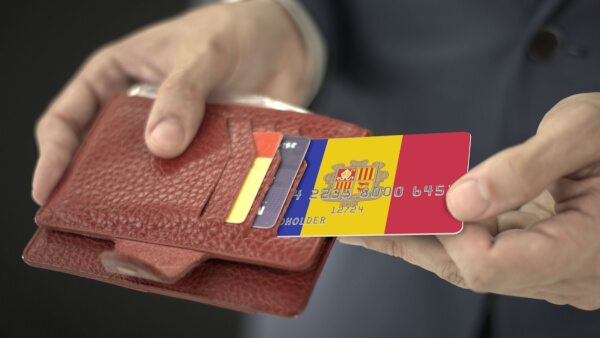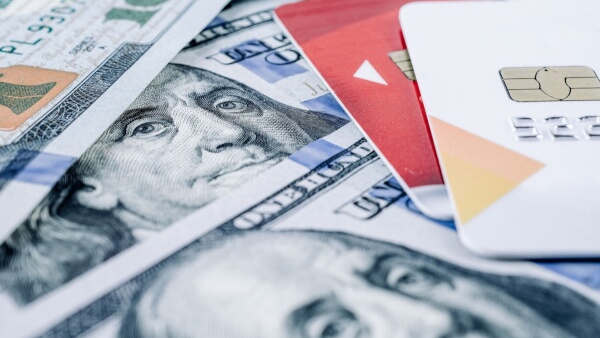How to open a UK bank account online in 2025
Check out our essential guide on how to open a bank account online, including bank types, required documents, fees, and more.

Planning to relocate or just moved to Canada from the UK? There are lots of things to sort out when you move overseas, from getting a visa to finding somewhere to live. But one of the first things you’ll need is a bank account.
Without a bank account, you’ll find it difficult to pay rent and bills, and to make everyday purchases such as groceries. You’ll also need somewhere to receive your salary if you’re planning to work in Canada.
In this guide, we’ll cover all the essentials of opening a bank account in Canada. We’ll run through how to apply, the different banks you can choose from and the fees you need to know about.
Also, there are alternatives to a bank account, like the Wise account from the money services provider Wise. It’s a travel-friendly, international account that lets you send, spend and receive 40+ currencies worldwide all in one place. Your money is always safeguarded and you’ll also get dedicated support when sending large amount transfers.
Learn more about the Wise Account 💰
To open a bank account in Canada, you’ll need to provide certain pieces of documentation. The most important are documents which verify your identity. The required documents vary from bank to bank, but here’s what you’re likely to need:¹
Yes, if you’re not a Canadian citizen, you can still open a Canadian bank account. As long as you have the right identification and other documentation, you can open an account even if you don’t have a job or even the money for an initial deposit right away.
While this is good news, you may still find acquiring the relevant documentation a little tricky in some circumstances. For example, you may not have a Social Insurance Number (SIN)², which banks are required to ask for under Canada’s Income Tax Act.
You can apply for a SIN using a work or study permit, along with your passport. Alternatively, some banks will accept applications from non-residents without a SIN, and you may also be able to open non-interest-bearing bank accounts without one.
Yes, with some banks in Canada, you can complete the process of opening a bank account entirely online.³ However, it depends on your circumstances and what documentation you have, as well as the bank and the account type you’re applying for. It’s a good idea to contact the bank in advance to check if your particular circumstances are right for an online-only application.
For other banks, you’ll need to make at least one branch visit in person. This means a trip to Canada if you’re not already living there, to complete the application process and open your new bank account.
| 📚 Read more: Moving to Canada from the UK: A starter guide |
|---|
If you’ve not yet started your move to Canada, the good news is that you should be able to at least start your bank account application from overseas. The first crucial step is to contact the bank, to check what you’ll need to do and the documents you’ll need.
Bear in mind that it can take a few days to open a Canadian bank account from overseas. It can also be quite complex, with many calls between you and a dedicated account-opening team. To make sure this process goes smoothly, make sure you have your immigration documents, permits and all other documents sorted in advance.
For many banks, you may need to physically visit a branch to complete the process once you arrive in Canada. This can potentially work in your favour, as it can be easier and quicker to iron out any issues in person.
While Canada’s major banks do offer products tailored specifically to newly arrived non-residents, you may find that your choice of accounts and services is limited. Due to this, and the complexity of applying from overseas, it could be best to wait until you arrive in Canada to open a bank account.
However, there are alternatives for managing your money across borders, like the Wise Account. With this account, you can send and receive money internationally for low fees* and the mid-market exchange rate. It’s not a bank account but offers many similar features.
You can register for an account before you even arrive in Canada, which is super handy if you have moving costs to cover or payments to receive.
Banking is one of the most important industries in Canada, with the market dominated by a handful of major banks. The industry is technologically-advanced and known for high service levels.
And the good news for anyone opening an account in Canada is that it is widely considered to have one of the safest banking systems in the world.⁴
There are many banks to choose from but the most famous ones are:
RBC is the largest bank in Canada, offering customer service in an impressive 200+ languages.
Royal Bank of Canada is a popular choice among expats because of its Newcomers to Canada package.⁵ Here you’ll find heaps of helpful information and services to get your finances sorted as you settle into Canadian life, along with a choice of accounts, services and perks.
RBC offers the following chequing (current) accounts:⁶
RBC also offers dedicated bank accounts for students, and for business customers.
TD Bank is another major bank offering a special package for newcomers to Canada. There’s a dedicated hub offering helpful information and advice, along with a newcomer special offer of no monthly fees for 12 months.
You can open the following accounts with TD Bank:⁷

One of the top five biggest banks in Canada, with an impressive 3500+ ATMs across the country, Scotiabank offers four main chequing accounts⁹:
Scotiabank also offers a fee-free Student Banking Advantage Plan, with unlimited debit transactions.
Bank of Montreal is the oldest bank in Canada, and another that offers a dedicated package for newcomers to the country.
The BMO NewStart Program¹⁰ includes all kinds of special offers and perks on chequing accounts¹¹, including no monthly fees on its Performance Plan chequing account, a $60 cash bonus for renting a safety deposit box, and more.
This account offers unlimited transactions and a cash bonus for completing certain transactions so be sure to consult with their customer support about the terms.
Other accounts from BMO include:
The Canadian Imperial Bank of Commerce (CIBC) is another of the major banks in Canada with a Newcomers to Canada Plan.¹² This includes an CIBC Smart for Newcomers Account which has no monthly fee for 2 years, paperless record-keeping and it also comes with a debit card.
We’ve covered all the major banks in Canada, but it may also be worth checking out smaller banks such as Canadian Western Bank, National Bank of Canada, HSBC Bank Canada and Laurentian Bank while you’re comparing options.
However, when it comes to the ease of opening an account as a non-resident, it may be best sticking to larger banks with dedicated newcomer packages.
The great news for newbies arriving in Canada is that most of the major banks offer dedicated introductory offers on monthly account fees. This is usually from 6–24 months, as part of newcomer to Canada packages.
Otherwise, checking accounts tend to have monthly fees of up to $30 CAD¹³ depending on whether it’s a basic or premium account. With some banks though, you can waive these fees by maintaining a minimum daily balance.
Aside from monthly fees, you should also make a note of transaction, ATM and international fees when researching Canadian bank accounts.
Most bank accounts give you a set number of free transactions per month, if not unlimited. For any transactions above your monthly limit, you can expect to pay around $1.25 CAD¹⁴ per transaction.
If you use your own bank’s ATM to withdraw cash within Canada, you shouldn’t be charged any fees. Use another bank’s ATM though and you can expect to pay around $2 CAD¹⁵ per withdrawal.
Lastly, there are international transfer fees to consider. You may get a few free international transfers as a newcomer to Canada, but otherwise a fee may be charged. Receiving banks may also apply a fee to complete international transfers.
| 📚 Read more: Cost of living in Canada: Your guide |
|---|
You need to be a little careful when sending money overseas from your Canadian bank account. Even if you aren’t charged an initial fee to arrange the transfer, there may be hidden fees in the form of a terrible exchange rate. This eats into your money, making the overall cost of sending money home or to friends in other countries more expensive.
If you want a truly international account that works pretty much anywhere, check out the money services provider Wise, offering a multi-currency account, international money transfer services and an international debit card.
Open a Wise account online and you can manage your money in multiple major currencies, including GBP, CAD, USD and many more. It’s not a bank account but offers many similar features.
When sending money internationally or converting currency, you’ll only pay a low, transparent fee while also getting the mid-market exchange rate every time – no hidden fees or margins. Your money is always safeguarded and you’ll also get dedicated support when sending large amount transfers.
And, you can spend just like a local in 150+ countries worldwide with your Wise card. It automatically converts currency whenever you spend, so there’s no need to change money or carry cash around with you.
After reading this guide, you should be all set to open a bank account in Canada. As Canada’s banking industry is one of the most welcoming in the world to newcomers, you should find it relatively straightforward.
So, get your documentation all sorted and get started – good luck with your Canadian adventure!
Sources used:
Sources last checked on 04-February-2024.
*Please see terms of use and product availability for your region or visit Wise fees and pricing for the most up to date pricing and fee information.
This publication is provided for general information purposes and does not constitute legal, tax or other professional advice from Wise Payments Limited or its subsidiaries and its affiliates, and it is not intended as a substitute for obtaining advice from a financial advisor or any other professional.
We make no representations, warranties or guarantees, whether expressed or implied, that the content in the publication is accurate, complete or up to date.

Check out our essential guide on how to open a bank account online, including bank types, required documents, fees, and more.

Check out our essential guide on how to open a bank account in Jersey as a British expat, including documents, fees, banks and much more.

Check out our essential guide on how to open a bank account in Monaco as a British expat, including documents, fees, banks and much more.

Check out our essential guide on how to open a bank account in Andorra as a British expat, including documents, fees, banks and much more.

Read our rundown of the best Nationwide USD account alternatives available in the UK, including HSBC, Lloyds, Wise, Barclays, Revolut and more.

Read our essential guide to the Revolut USD Account, including info on features, fees, rates, limits and how to apply.